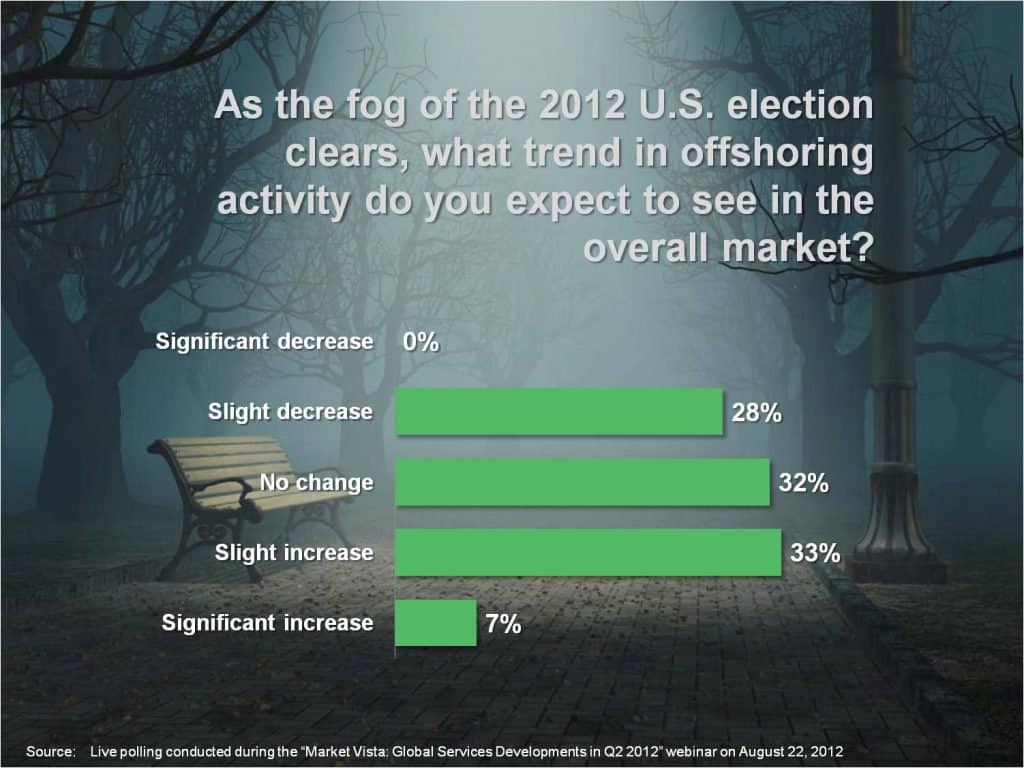
In our last Market Vista webinar, we asked the audience to share its perspective on what is likely to happen with offshore demand as the election season in the United States concludes. As shown in the poll results below, few expect much to change after the election season – the votes are tightly clustered around slight change or no change.
Although the results are consistent with my own personal view, it is certainly in contrast to the number of times I am asked about this topic by the media and other industry observers.
So why is there more noise than substance? Why does the global services market see the political rhetoric as largely irrelevant?
Three fundamental facts largely explain it:
- The U.S. government is much more concerned about offshore manufacturing than offshore services. Not surprisingly, politicians play fast and loose with terminology in their public speeches – does anyone recall a politician accurately using the terms offshoring and outsourcing? They are happy to publicly paint with a broad brush criticizing “offshoring.” But offshore services are continuing to grow and the business case remains strong. In contrast, the reality is that the economics of offshore manufacturing are more complex (for example, the cost of energy and transportation continue to increase), and there is a good business case for moving some types of manufacturing back onshore. Check out the Obama administration’s report on insourcing released at the January 11, 2012, insourcing forum to see just how much of the focus is actually on manufacturing and not services (or read this update). China is mentioned 17 times, India only once. For offshore services, the business case is simply too attractive (in most cases) for the government to push hard for broad-scale onshoring.
- The United States has a shortage of information technology talent. Despite the very real concern about broad-based unemployment, technology jobs are still hard to fill. This is why so many organizations have sought to increase their access to these skills either through offshore resources and immigration from other countries. Given the obvious strategic value for the United States to be strong in information technology-intensive industries, it must avoid hindering access to the skills and resources required to allow these portions of the economy to flourish. Of course the politicians cannot easily acknowledge this in public.
- The United States has to be a member of the global economy. Although the United States has lost and will lose jobs due to offshoring of services, it also gains much from global services and strong participation in the global economy. It is well understood that U.S. companies benefit from selling products around the world – these range from consumer devices to movies to industrial goods. However, it is less well understood that the United States also exports many services in addition to importing services. Engineering firms, law firms, architecture firms, and many other professions are serving global customers and often by providing high-end services. Next time you are on a plane flying to Asia, ask others traveling with you about their business interests and whether they derive benefit from global trade. In the past two years of trekking to India, I have come across a guide specializing in personalized nature tours of India, a machining engineer helping Harley Davidson enter India to sell its goods, a doctor providing specialized training, and even a dancer for Lady Gaga in route to film a video. They (and many others) are all traveling to Asia to satisfy global demand for their services. There is no realistic choice other than to participate in the global economy and focus on relative strengths.
Stepping back, we must bear in mind that politicians are typically speaking to their audience through mass media and messaging accordingly. In other words, what we hear is dumbed down and intended to grab emotions and headlines. However, outside of the noisy rhetoric, top politicians and policy makers do understand the fundamental forces shaping the U.S. and global economies and are unlikely to meaningfully influence the evolution of global services and associated offshoring – regardless of whether Obama or Romney wins the U.S. presidential election.











